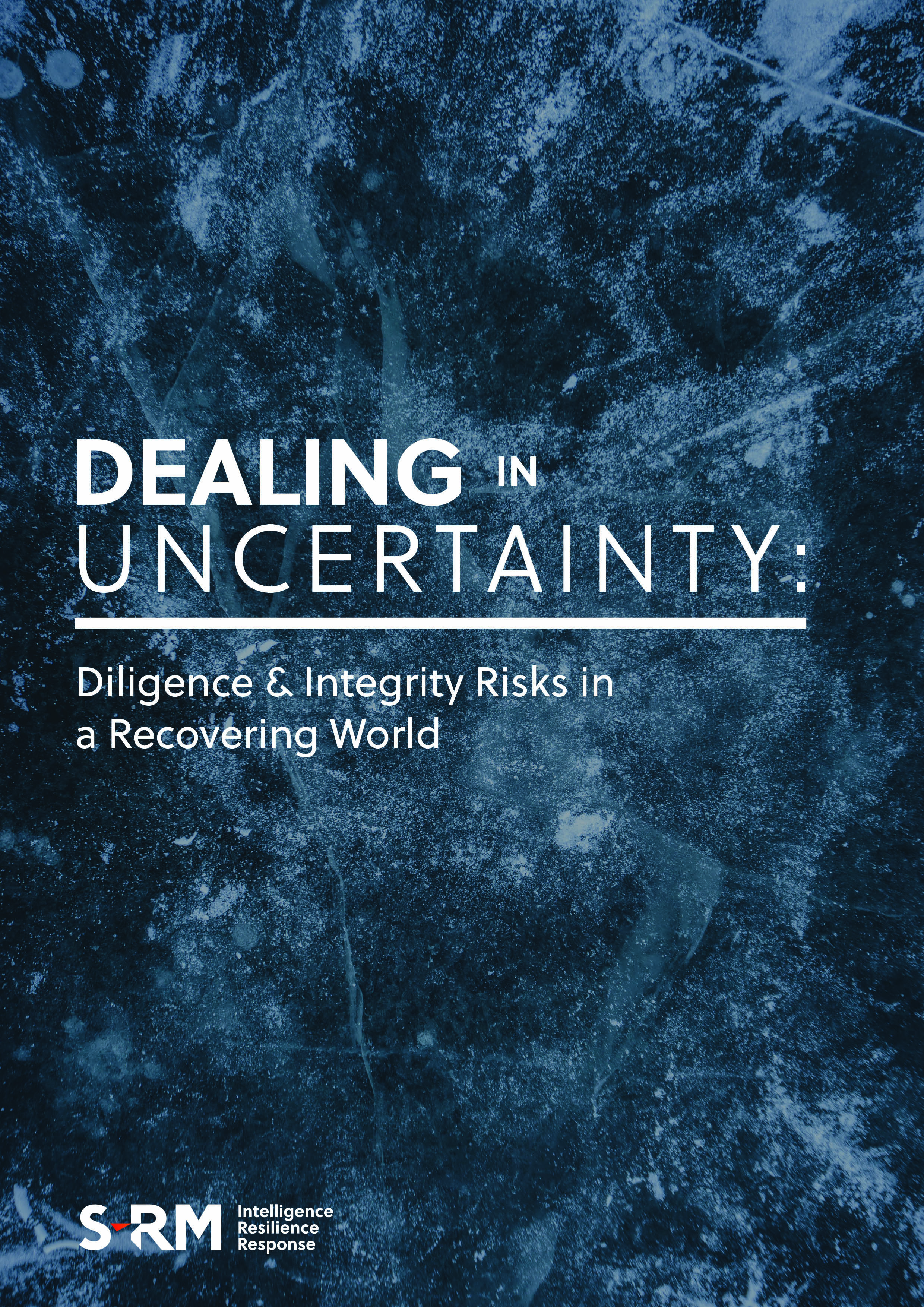Since the start of the COVID-19 crisis, deal volumes have been suppressed, with general partners focused on shoring up portfolio companies. What deal-making has occurred has been concentrated in less affected sectors such as technology, healthcare and infrastructure. However, private equity firms are sitting on record levels of dry powder – USD 1.46 trillion according to Preqin – meaning deal-making must recover, and soon.
S-RM has already witnessed this in Greater China, where deal activity among our clients has gained pace since May. While lockdowns are easing across the world, travel restrictions and social distancing measures will continue. Consequently, more – and in some cases all – of the deal-making process will be remote and virtual.
Fund managers are actively considering which sectors and industries are most attractive in the new environment. A sustained economic downturn – and differences in the pace of recovery – means that investors will invariably be more exposed to new industries and geographies. High competition for a limited supply of distressed assets or opportunities in ‘hot’ sectors will put pressure on deal teams, shortening the deal process and potentially leading to expedited decision-making. All this at a time when fraud and cyber risks are elevated, as businesses come under pressure to attract investors and secure loans, and criminals exploit an uncertain environment and vulnerabilities in remote working.
Law firms and insurers have adapted to deal-making in various ways. As an intelligence firm, S-RM is also innovating to reflect investors’ priorities. In this article, we share lessons from recent engagements to help GPs and other investors navigate risk in this unique investment climate. We highlight (a) how investors are structuring intelligence into the deal-process; (b) the constraints on intelligence gathering amid the crisis, and (c) the peculiar cyber, fraud, corruption, and reputational risks at play post-COVID-19.
How are other service providers adapting?
| Law firms |
| Law firms have adapted to the crisis in various ways - for instance, boosting buyer protection in purchase agreements, and evaluating legal resilience as part of the due diligence process. In a recent interview with S-RM’s Martin Devenish, former PE lawyer and coach Phil Sanderson stressed the latter point, advising GPs to assess the breadth of a target’s supplier base and to avoid “reliance on a model or way of doing things which may not last - assume that a lot will not last in the post-lockdown world”. |
| Insurers |
| Insurers are also adapting their approach. Joseph Laws, head of AXA XL’s M&A insurance division, which offers Representations and Warranties (R&W) cover ahead of large-cap private equity investments, says that his team has focused on adapting aspects of their offering in the wake of recent events: “For us, in quoting through COVID-19, are two principal ways of handling this new area of risk: an outright exclusion, or underwriting certain aspects of COVID-19 risks. Our approach lands somewhere in the middle.” Laws stresses the importance of innovation and adaptability in the R&W coverage – whether it’s coverage with respect to compliance with regulations for Paycheck Protection Program (PPP) loans in the US or adapting to an anticipated increase in distressed asset sales. Laws’ observations on R&W are broadly consistent with shifts among UK-based providers of Warranties & Indemnities insurance. |
Incorporating intelligence into the deal process
As PE firms recalibrate to a changed investment environment, there is an opportunity to revisit internal processes. While most firms already have an approach to gathering intelligence – through reputational due diligence on the target, background checks on management teams and market entry assessments aimed at assessing political and regulatory risk – it may not be the most effective one. Now may be a good time for firms to examine their intelligence requirements and ensure they are aligned with their requirements as an investor.
Through our work with a range of private equity investors – from large-cap funds, to mid-market investors, venture capital funds, Development Finance Institutions, and legal counsel to all the above – we have witnessed the full spectrum of approaches to intelligence gathering within the deal-making process globally.
Recent observed trends in our clients’ engagement with the intelligence process include:
- Earlier engagement. Investors are looking for ways to engage with the intelligence process earlier in the deal cycle, especially in the absence of in-person meetings with management teams. Running public record background-checks on key members of a target’s management team is relatively low-cost, entirely discreet, and can provide reassurance before a transaction reaches the exclusivity period.
- Focus on culture and ESG. Just as GPs are placing greater focus on targets’ commercial resilience, so too are they are starting to interrogate the role of culture in creating resilience. Intelligence can help investors assess how a target’s internal culture allowed them to weather the crisis, and whether they are likely to get through the ensuing challenges. At the same time, the ‘S’ in ESG is coming to the fore, as people look to their employers to safeguard their livelihoods, and consumers direct their money to businesses that ‘stepped up’ during the crisis and are taking meaningful action to address social injustice. This is an acceleration of a wider trend towards stakeholder capitalism, reflected in the FCA’s recent guidance on creating purposeful cultures.
- Involvement of deal teams. Intelligence works best when it is shaped by the priorities of the deal team. Some clients have taken advantage of reduced investment activity to engage with deal teams to ensure that due diligence and market intelligence are meeting their requirements and – while remaining independent – are seen as more of a tool than a hindrance. For example, we recently helped a client considering an acquisition answer questions about the owner’s attachment to the target and likely receptiveness to a sale, identifying key advisers that might facilitate an approach.
- Formalising the process. Clients have tended to take very different approaches to intelligence gathering. Large-cap funds and DFIs typically have a more institutional process mandating when to conduct reputational due diligence, or what constitutes a ‘high-risk transaction’. Mid-market funds, especially those playing in ‘home markets’, have traditionally taken a more ad hoc approach. Since the onset of the crisis, we’ve seen a shift towards running more regular background checks and reputational due diligence among mid-market clients.
- Cyber due diligence. With cyber-attacks on the rise since the start of the crisis, there is increasing recognition that a ‘check box’ approach to assessing cyber security is no longer adequate. Deal teams and general partners are looking to minimise their exposure to cyber security risks by conducting detailed cyber due diligence on their targets. Effective cyber due diligence can shed light on how vulnerable a target is to a cyber attack, what the likely financial impact of a data breach will be, and the cost of remediation – all of which can factor into valuations.
- Demand for market intelligence. As investors assess new sectors and geographies, we have seen an increase in requests for market entry reporting, focusing on regulatory, political and corruption concerns within unfamiliar jurisdictions – especially when the target is in a regulated industry.
Changes to intelligence gathering
The pandemic has brought changes – both positive and negative – to the intelligence gathering process. Rather than travelling on assignments, much of our work has been done remotely. In many ways, this has led to efficiencies, allowing us to reach more people, and we have found sources easier to get hold of and more open to speaking with us from their home settings. Earlier engagement by clients has helped us to solve logistical challenges in retrieving documents or arranging site visits and, since the start of the outbreak, we have completed source projects in jurisdictions as varied as China, the Philippines, Nigeria, Brazil, Russia and the UK.
There are, however, some limitations to be aware of:
- People can be more circumspect over the phone, making it difficult to gain reliable intelligence on high-risk targets during lockdown, especially in jurisdictions where communications are heavily monitored.
- Government operations remain limited in some countries, leading to delays in retrieving public documents such as company filings, court records, land titles, etc.
- Restrictions on movement have hindered our ability to make site visits and conduct on-the-ground surveillance in some countries.
In order to overcome these challenges we have leaned on our local offices and network of trusted local contacts who have kept us apprised of the situation on-the-ground, allowing us to act quickly when lockdowns ease, and who have leveraged their relationships to help us find workarounds. Having a strong network, developed through regular engagements, also means we don’t have to start from scratch. Local contacts will often have existing knowledge of a target, allowing us to provide an early heads-up about any immediate concerns.

Enhanced Cyber, fraud and reputational risks
COVID-19 has brought with it fear, uncertainty and massive economic damage across the world. This has in turn led to increased fraud, corruption and cyber security risks. It has also increased scrutiny of businesses and PE firms, resulting in heightened reputational risks.
Cyber security. The shift to remote working – and fear and uncertainty caused by the pandemic – has led to an increase in cybercrime globally. GPs and portfolio firms are at risk of being targeted. In April, a cyber security research firm revealed that cyber criminals had successfully targeted three UK private equity firms, tricking senior executives into clicking on fraudulent links, and using malware and stolen credentials to make bank transfers of USD 1.3 million. The attacks pre-dated COVID-19, but it’s not hard to see how the pandemic has created ideal conditions for cyber criminals.
Fraud and corruption. Fraud and corruption invariably rise during a recession, and governments and NGOs have warned of corruption in the context of the health emergency caused by COVID-19.
- The pandemic has sent many companies into crisis mode, forcing them to seek outside investment, renegotiate covenants with lenders or apply for government bailout money. Companies in this position may well be incentivised to misrepresent their financial health and the resilience of their business model to lenders and investors.
- Companies providing essential or emergency services face heightened corruption risks through increased exposure to government agencies, and fast-tracked procurement processes. They may also be dealing with stressed supply chains, having to scramble to find new suppliers and side-lining proper due diligence procedures.
- As companies shift more of their operations online, turning to digital marketing and e-commerce over traditional sales channels, sales and marketing teams may be tempted to cut corners or inflate sales figures to meet targets. In this context, investigating sales and user engagement data will be a key consideration for investors.
- While no industry is immune, sectors such as healthcare, technology and financial services – which are having to adapt rapidly to changed circumstances – may be particularly at risk. These are exactly the sectors that are attracting investment.
- Distressed asset sales also pose unique fraud risks (see below).
These pressures, combined with internal pressures to dedicate less resource to compliance, lead to heightened risks for GPs in respect of both investment targets and portfolio companies. In the US, the Department of Justice has shown a willingness both to scrutinise applications for bailout funds and hold PE firms accountable for fraud and corruption at portfolio companies, where the PE sponsor is judged to have participated in the fraud. GPs should take heed, especially those investing in companies that applied for government loans or who are repurposing portfolio companies to enter the highly regulated, and high profile, healthcare space.
Reputation. COVID-19 is accelerating a wider trend towards stakeholder capitalism. PE firms have been thrown into the spotlight, accused of burdening retail brands with debt through leveraged buyouts and applying for taxpayer-funded schemes while benefitting from tax efficient structures. The role of PE firms in supporting portfolio companies to deal with the crisis and, in many cases, provide essential services to citizens, has not been as well publicised. In a climate where businesses are being judged on how they acted during the crisis, PE firms need to demonstrate their positive impact on society. This will involve protecting employees, outreach to suppliers and customers, and working with public authorities to support communities and mitigate negative economic impacts on consumers. It will also involve assessing the behaviour of targets during the crisis, and whether this is indicative of wider cultural and integrity issues. The private sector has a clear role to play in the crisis, and PE firms should be at the forefront.
Fraud Risks – Distressed asset salesIn the context of COVID-19, distressed asset sales outside of a formal bankruptcy process are becoming more popular as they are quicker and cheaper than going through the courts. This also makes them riskier; the buyer has fewer legal protections and, in the US, the transaction risks being considered a fraudulent transfer and ultimately unwound by a court. The shortened timeframes present challenges for due diligence, which is more important than ever under these circumstances. Joseph Laws of AXA XL flags 363 sales in the US as a concern, because such transactions tend to operate under different deal dynamics than typical mergers and acquisition transactions. Laws urges buyers to “continue to run typical diligence processes in these types of deals so that comparable representation and warranty coverage can be obtained for these distressed assets and targets”. Fraud should be a key focus for any investor considering acquiring a distressed asset. Most buyers will conduct legal and financial due diligence, commission forensic audits, and send industry experts to conduct site visits to value assets. Intelligence firms can support this process in several ways. This includes tracing beneficial ownership, helping the buyer to establish whether the asset is in fact owned by the seller, and that they are not unwittingly participating in a scheme to defraud the real owner. We can conduct asset tracing to verify a target’s assets and identify any undeclared liens or encumbrances. Finally, through discreet enquiries with sources close to the target, we can help establish whether the bankruptcy was in fact the result of an economic downturn and/or bad business decisions, or whether it can be traced to fraudulent practices, such as embezzlement by the management or seller. Speaking to people who know the business inside out gives you the best chance of uncovering fraudulent and corrupt practices, such as over-invoicing, kickbacks, and financial misstatements, as well as conflicts of interest, hidden ties between the vendor and management, and payments to government officials. |
Deal-making and intelligence gathering have had to adapt both to new constraints and new risks and challenges imposed by COVID-19. The pandemic has exposed the interdependence of business and society. At the same time, opportunities for bad actors to exploit the changed environment, and incentives for executives and business owners to cut corners out of desperation, have increased. In these circumstances, good intelligence is more valuable than ever. GPs need insight into regulatory, political and corruption risks as they invest in new sectors. They need insight into the culture of target companies, how management teams responded to the crisis, and how they are set up to respond to cyber threats. They also need to monitor portfolio companies to ensure that they aren’t putting the reputation of their sponsor at risk. Early engagement between deal teams, compliance, legal counsel and intelligence firms will help ensure investors get the information they need and can act quickly to seize opportunities as investment activity resumes and picks up pace.



 Email Toby
Email Toby





 @SRMInform
@SRMInform
 S-RM
S-RM
 hello@s-rminform.com
hello@s-rminform.com

